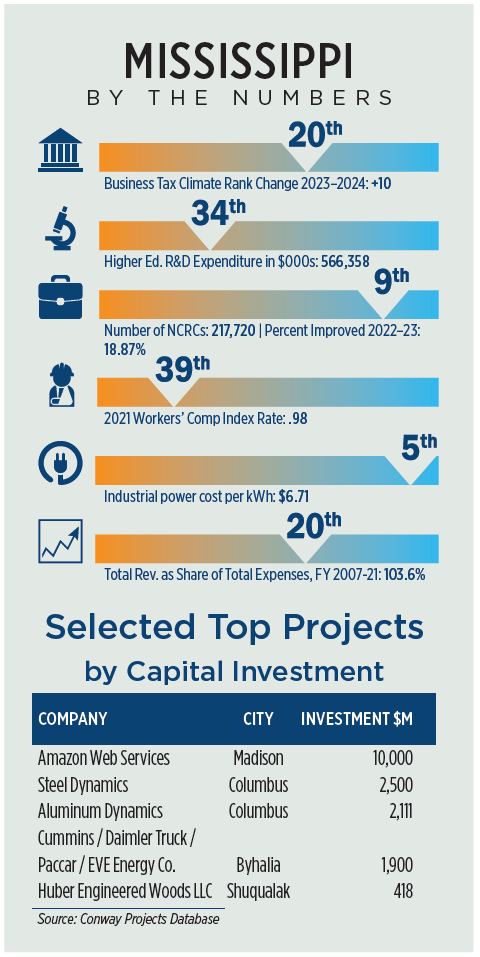From speed-to-market to life-saving research, Mississippi has the infrastructure in place.
When an international manufacturer aims to expand its logistics network throughout the Americas it’s no surprise the southeastern U.S. naturally emerges for top investment consideration.
It’s a factor that has led Switzerland-based equipment manufacturer Liebherr to introduce its first U.S. logistics distribution center in Tupelo, Mississippi. To date, the company’s European customers are covered by established distribution centers in Germany and the Netherlands, albeit these locations left more to be desired in serving markets abroad.

Thus a strategic site selection search commenced for the Liebherr team, leaving no stone unturned as they checked off a list of critical location needs. Tennessee, Arkansas and Mississippi rose as final contenders for the company, but in the end Mississippi took the $176 million project win.
“The Liebherr Group conducted a comprehensive analysis of material flows, including the access to transport companies, available infrastructure and population, and as a result the Memphis metropolitan area emerged as the ideal region,” says Liebherr Managing Director of Logistics Joerg Stroebele. “After further research, the city of Tupelo was identified as an ideal location.”
The city’s geographic position, robust industry ecosystem, workforce base and advanced logistics infrastructure, including proximity to highways and rail connections, were just the ingredients the team hoped to find. After acquiring about 118 acres of the HIVE Business Park in July 2024, the company now looks to build long-term success in the region.
While site availability was a key factor in selecting the HIVE Business Park, its existing infrastructure for site connection and rapid preparation for construction work would allow Liebherr to begin building the new facility with ease. With future growth in mind and a potential final investment of up to $238.4 million, additional acreage on hand affords space to expand operations at will.
“The continental warehouse in the USA is part of a future global warehouse network,” Stroebele continues. “This will enable the Liebherr Group to offer an improved service for our customers, including faster delivery times, improved reliability, optimized processes and high-quality services through automation with state-of-the-art technology.”
Liebherr’s over-1-million-sq.-ft. logistics center will handle warehousing, distribution, customs and exporting and services like pre-assembly, kitting and repackaging by 2026. Products housed at the distribution facility include earthmoving machinery, concrete technology, tower cranes and maritime cranes. Additional products may be introduced upon an increased final investment, although Stroebele says those details are still in discussion. This location expands the company’s portfolio in the U.S., as the company houses 14 various sales and service centers around the nation.
Construction work has begun for the project and will create 180 new direct jobs once complete, which could scale to a total of 342 jobs following a project investment boost. The Mississippi Development Authority (MDA) will provide the project with its Mississippi Flexible Tax Incentive. Lee County, the City of Tupelo and MDA will also supply assistance for construction and equipment needs for the facility.
“Among many other criteria, incentives were only one factor,” says Stroebele. “The decision was primarily driven by a thorough cost-benefit analysis, the long-term development of our strategic plan for the entire region and the settlement of existing and future companies.”
Alternative Explorations
Since 1968, the University of Mississippi has received funding from the National Institute of Drug Abuse (NIDA) to grow cannabis and provide cannabinoid materials such as cigarettes, extracts and purified cannabinoids for research taking place around the nation.
This funding focused on task orders specific to federal projects without room for further exploration. In April 2024, Senate Bill 2888 was approved by Mississippi Governor Tate Reeves to establish the Mississippi Medical Cannabis Research Program at the university’s National Center for Cannabis Research and Education (NCCRE) to explore the therapeutic benefits of medical cannabis for patients.
“We are hopeful that our efforts will ultimately lead to economic development in this field,” says NCCRE Director Robert Welch. “With proper training, education of health care professionals, policymakers and the public, we hope to empower them to be able to enter this area with confidence and better understanding of how it all works.”
The program began in July and over the next year appropriates $1.5 million to researchers at the university’s School of Pharmacy, where five projects will be pursued. The first includes building a new website to share cannabis research findings and how the research can translate to modern health care practices.
“The Mississippi Medical Cannabis Research Program at the NCCRE is totally separate from the NIDA project,” notes Welch. “We are to use our funding from the state to partner with the Mississippi Department of Health’s Mississippi Medical Cannabis Program for a number of research and educational activities.”
The NCCRE will additionally plan to collaborate with the university’s National Center for Natural Products Research and Center for Pharmaceutical Marketing and Management. Aside from independent projects, Welch shares that partnerships with other research entities who are looking for federal and state program funding will be explored for various areas of interest outlined by the new law.
The prospect of research outcomes is promising as over 45,000 patients are enrolled in the Mississippi Department of Health’s Medical Cannabis Program, whose data will be analyzed to determine quality of life measures, safety, efficacy and cost. Experts housed at UM will begin conducting in vitro, in silico and in vivo studies comparing different cannabinoids and how they interact with commonly prescribed and over-the-counter drugs.
“There still exists a stigma for using cannabis products, especially smoking. The variety of products available at licensed medical cannabis dispensaries has helped to curb the stigma because consumers and patients now don’t have to smoke, but can take gummies, tinctures, capsules and more,” says Welch. “However, our research and educational efforts are focused on elucidating the positive and negative health effects of all these products, as well as demonstrating the differences among the different formulations.”
Development of a Purified CBD Extract Product, which UM researchers have placed into a refractory epilepsy study at the university’s Medical Center in Jackson, will also grow under this program. The goal is to expand its development and implementation toward other diseases and medical conditions.
Although the program is set to run for one year, these projects will be ongoing following this fiscal year. Welch hopes to secure additional funding next spring to keep the program growing moving forward.

